文秘Week 12 Effective Communication
交际效果英文作文高中
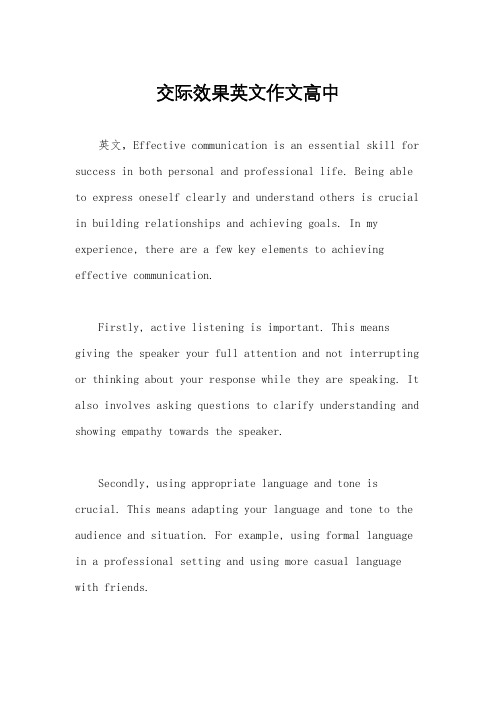
交际效果英文作文高中英文,Effective communication is an essential skill for success in both personal and professional life. Being able to express oneself clearly and understand others is crucial in building relationships and achieving goals. In my experience, there are a few key elements to achieving effective communication.Firstly, active listening is important. This means giving the speaker your full attention and not interrupting or thinking about your response while they are speaking. It also involves asking questions to clarify understanding and showing empathy towards the speaker.Secondly, using appropriate language and tone is crucial. This means adapting your language and tone to the audience and situation. For example, using formal language in a professional setting and using more casual language with friends.Lastly, nonverbal communication is also important. This includes body language, facial expressions, and tone of voice. It is important to be aware of these nonverbal cues and to use them effectively to convey your message.中文,有效的交际能力是个人和职业生涯成功的关键技能。
职场高效沟通笔记英语作文
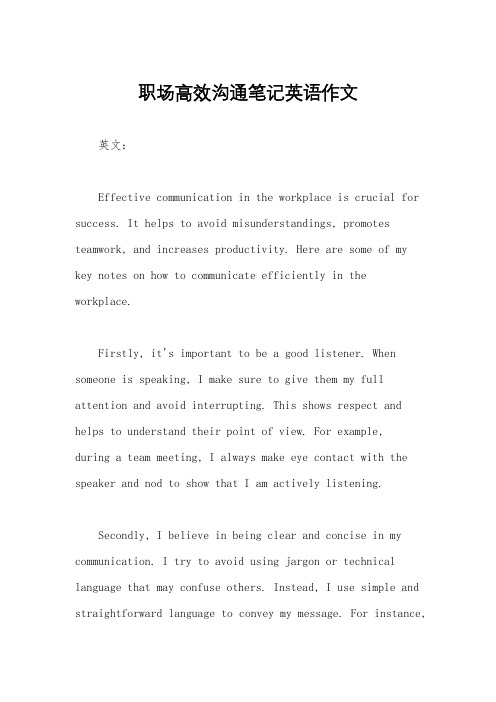
职场高效沟通笔记英语作文英文:Effective communication in the workplace is crucial for success. It helps to avoid misunderstandings, promotes teamwork, and increases productivity. Here are some of my key notes on how to communicate efficiently in the workplace.Firstly, it's important to be a good listener. When someone is speaking, I make sure to give them my full attention and avoid interrupting. This shows respect and helps to understand their point of view. For example,during a team meeting, I always make eye contact with the speaker and nod to show that I am actively listening.Secondly, I believe in being clear and concise in my communication. I try to avoid using jargon or technical language that may confuse others. Instead, I use simple and straightforward language to convey my message. For instance,when I send an email to my colleagues, I make sure to organize my thoughts and keep the message to the point.Additionally, I find it helpful to ask for feedback. This shows that I value the opinions of others and am open to improving my communication skills. For instance, after giving a presentation, I always ask my colleagues for their thoughts and suggestions for improvement.Moreover, I make an effort to be mindful of non-verbal communication. I pay attention to my body language and facial expressions to ensure that they are in line with my words. This helps to convey authenticity and build trust with my colleagues.In conclusion, effective communication in the workplace is essential for building strong relationships and achieving common goals. By being a good listener, using clear language, seeking feedback, and being mindful of non-verbal cues, I strive to communicate efficiently in the workplace.中文:在职场中,高效沟通对于成功至关重要。
Effective Communication—有效的人际沟通

Page 22
观察:直接性
间接/征询导向 -喜欢提问的方式 (要不要坐下来) -喜欢倾听/不太表达自己的观点
语言 (说话)
直接/指令导向 -喜欢叙述祈使句的方式 (请坐) -喜欢说话/表达自己的观点
-平稳,不是很有力量 -音量低,语速缓慢
语音 (音调)
-语音变化多,有力量 -音量高,语速快
-握手轻,目光接触时有时无 -很少用肢体语言/手势 -有耐心
视觉 (肢体语言)
-握手有力,一直有目光接触 -需要强调的时候,常用肢体语言/手势 -没有耐心
Page 23
做出判断
判断他的开放性如何?
内敛
通过环境和行为观 察后,可以初步判 断出对方的直接性 和开放性如何,然 后将二者进行匹配
开放
直接+开放 =表达型
判断他的直接性如何?
间接 直接
Page 24
行为风格特征概述
理解感受 共同面对 共同面对
Page 17
用同理心回应
•理解对方的感受,进入对方的角色
•与对方共同面对来寻求解决之道
Page 18
倾听中避免出现以下行为
•Advise •Leading •Interrupt •Evaluate
给对方出很多“招儿” 大谈自己的经验 引导对方 打断对方 评价、反对对方的话
增强工作导向表达方式 •讨论工作任务,强调事实而非感觉 •沟通中保证逻辑清楚 •认可对方对时间的关注 •减少手势和面部表情的使用 增强征询导向影响方式 •先询问对方的意见 •放慢交流的步调 •倾听且不打断话题 •更多的停顿 •寻求对方承诺,但不增加压力 增强人际导向表达方式 •表达你的情感 •给予个人表扬 •参与闲聊 – 交际 •更多使用手势和面部表情, 并改变你的声调
高效沟通英文作文
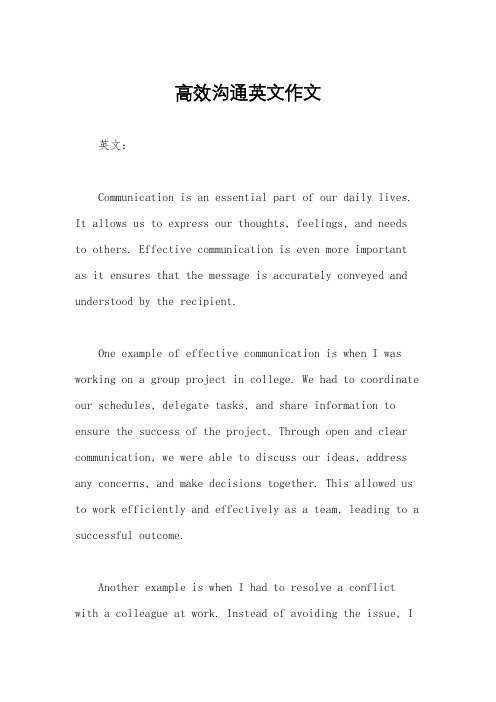
高效沟通英文作文英文:Communication is an essential part of our daily lives. It allows us to express our thoughts, feelings, and needs to others. Effective communication is even more important as it ensures that the message is accurately conveyed and understood by the recipient.One example of effective communication is when I was working on a group project in college. We had to coordinate our schedules, delegate tasks, and share information to ensure the success of the project. Through open and clear communication, we were able to discuss our ideas, address any concerns, and make decisions together. This allowed us to work efficiently and effectively as a team, leading to a successful outcome.Another example is when I had to resolve a conflict with a colleague at work. Instead of avoiding the issue, Iinitiated a conversation to express my concerns and listento their perspective. Through active listening andrespectful communication, we were able to find a solution that satisfied both parties and improved our working relationship.中文:沟通是我们日常生活中不可或缺的一部分。
英语作文-有效沟通的技巧

英语作文-有效沟通的技巧Effective Communication Skills。
Effective communication is essential in both personal and professional contexts. It serves as the foundation for building strong relationships, resolving conflicts, and achieving mutual understanding. In this essay, we will explore various techniques and strategies to enhance communication skills.Firstly, active listening is a cornerstone of effective communication. Instead of simply hearing words, active listening involves fully engaging with the speaker, understanding their perspective, and showing empathy. This can be achieved by maintaining eye contact, nodding in acknowledgment, and paraphrasing to confirm understanding. By demonstrating genuine interest and attentiveness, you create a conducive environment for open dialogue.Moreover, the art of nonverbal communication plays a significant role in conveying messages. Body language, facial expressions, and gestures can often speak louder than words. Therefore, it's crucial to pay attention to nonverbal cues both when speaking and listening. Maintaining an open posture, making eye contact, and mirroring the other person's body language can foster rapport and trust.Furthermore, clarity and conciseness are vital elements of effective communication. Expressing thoughts and ideas in a clear and straightforward manner minimizes misunderstandings and ensures that the message is received as intended. Avoiding jargon and unnecessary complexity allows for greater accessibility and comprehension across diverse audiences. Additionally, organizing information logically and using visual aids when appropriate can enhance clarity and retention.In addition to verbal and nonverbal communication, active engagement is essential for meaningful interactions. Encouraging participation, asking open-ended questions, and soliciting feedback demonstrate respect for others' opinions and perspectives. Creating asafe and inclusive space where everyone feels valued and heard fosters collaboration and innovation.Furthermore, empathy and emotional intelligence are indispensable qualities for effective communication. Being able to understand and empathize with others' emotions enables you to respond appropriately and build trust and rapport. Acknowledging feelings, validating concerns, and offering support demonstrate empathy and strengthen interpersonal connections.Additionally, adaptability and flexibility are crucial for navigating diverse communication styles and situations. Being able to adjust your communication approach based on the context, audience, and objectives ensures relevance and effectiveness. Whether it's tailoring your language to resonate with different cultural backgrounds or modifying your delivery to suit various personality types, adaptability enhances communication outcomes.Lastly, conflict resolution skills are essential for managing disagreements and maintaining harmonious relationships. Instead of avoiding or escalating conflicts, effective communicators seek to understand the root causes, actively listen to all parties involved, and collaborate on finding mutually beneficial solutions. By fostering open dialogue, promoting empathy, and practicing compromise, conflicts can be resolved constructively, fostering stronger relationships and fostering a positive work environment.In conclusion, effective communication skills are indispensable for success in both personal and professional spheres. By cultivating active listening, mastering nonverbal communication, prioritizing clarity and conciseness, fostering engagement and empathy, embracing adaptability, and honing conflict resolution skills, individuals can enhance their communication abilities and build stronger connections with others. Ultimately, by striving for effective communication, we can foster understanding, cooperation, and harmony in our interactions.。
关于沟通的英语作文
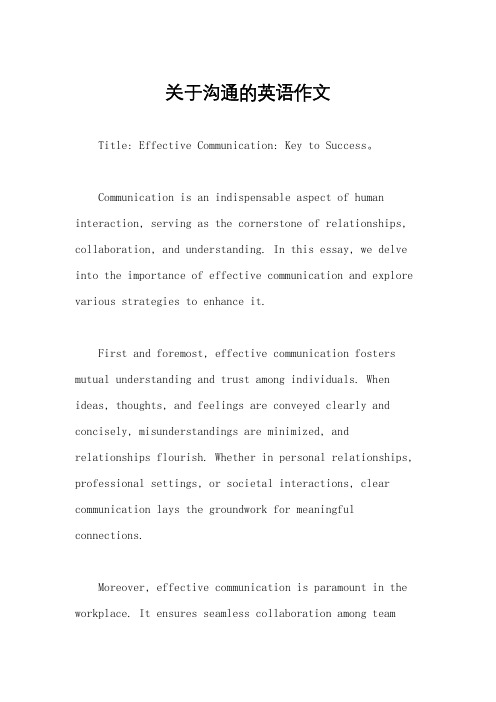
关于沟通的英语作文Title: Effective Communication: Key to Success。
Communication is an indispensable aspect of human interaction, serving as the cornerstone of relationships, collaboration, and understanding. In this essay, we delve into the importance of effective communication and explore various strategies to enhance it.First and foremost, effective communication fosters mutual understanding and trust among individuals. When ideas, thoughts, and feelings are conveyed clearly and concisely, misunderstandings are minimized, and relationships flourish. Whether in personal relationships, professional settings, or societal interactions, clear communication lays the groundwork for meaningful connections.Moreover, effective communication is paramount in the workplace. It ensures seamless collaboration among teammembers, enhances productivity, and facilitates innovation. In a corporate environment, miscommunication can lead to costly errors, delays, and conflicts. Therefore, organizations invest in communication training and tools to optimize internal and external communication channels.Furthermore, effective communication is instrumental in resolving conflicts and addressing grievances. By fostering open dialogue and active listening, conflicts can be de-escalated, and solutions can be reached amicably. Whether in interpersonal disputes or international negotiations, effective communication skills are essential for achieving peaceful resolutions.In addition, effective communication is integral to leadership effectiveness. Leaders who communicate with clarity, empathy, and authenticity inspire trust and motivate their teams to achieve common goals. Through effective communication, leaders articulate vision, provide feedback, and empower their followers to excel.To enhance communication skills, individuals can adoptseveral strategies:1. Active Listening: Listening attentively without interrupting fosters empathy and understanding. Reflecting on what others say before responding demonstrates respect and encourages open dialogue.2. Clear Expression: Communicating thoughts and ideas with clarity and precision minimizes ambiguity and confusion. Using simple language, avoiding jargon, and organizing information logically enhance comprehension.3. Nonverbal Cues: Paying attention to nonverbal cues such as body language, facial expressions, and tone of voice complements verbal communication. Aligning nonverbal cues with spoken words enhances sincerity and credibility.4. Empathy: Understanding others' perspectives, emotions, and needs fosters empathy and strengthens interpersonal relationships. Acknowledging and validating others' feelings before offering solutions demonstrates empathy and builds trust.5. Feedback Mechanisms: Soliciting feedback andactively seeking input from others fosters a culture of continuous improvement. Constructive feedback enables individuals to refine their communication skills and adapt to diverse audiences.6. Adaptability: Flexibility in communication style and approach enables individuals to connect with diverse audiences effectively. Adapting communication strategies based on cultural norms, personality types, and situational contexts enhances rapport and understanding.In conclusion, effective communication is essential for building meaningful relationships, fostering collaboration, and achieving success in various aspects of life. By honing communication skills and adopting strategies such as active listening, clear expression, and empathy, individuals can navigate interpersonal dynamics with confidence and proficiency. As communication is a lifelong learning process, continuous practice and refinement are key to mastering this invaluable skill.。
effective communication有效的交流

倾听的五个层面
• • • • • 充耳不闻 看上去在听 有选择的听 专心的听 设身处地的听
提出问题以节约时间
• 公开的提出问题
开始一个话题的技巧 - 公开的中性的询问: 没有偏见,建立一个良好 的环境,改善交流,收集大量的信息 - 公开的导向的询问:提出新的话题,控制整 个谈话。
• 结束询问Байду номын сангаас
结束谈话的技巧
信息的组成成分
陈述事实: 我向听众提供了什么信息? 自我评价: 我如何介绍自己? 关系: 要求:
我与听众是什么关系? 我希望听众做什么?
“我”-信息的优点
• 更加主动,诚实 • 通过自己所说来表达自 己的立场 • 不要攻击你的搭档 • 避免无休止的职责 • 鼓励别人使用“我”-讯 息 • 开放与诚信的环境 • 更令人心悦诚服
60 40 20 0 语调 非语言的 词汇
语言和非语言交流
• 语言交流
1.语言的外部表现-语调,音量,声调,表达质量。 2.语言的内部表现-修辞,逻辑,一种语言的相关意思。
• 非语言交流
1.举止 2.姿态 3.目光交流 4.面部表情
有效交流的基本因素
1. 阐明你的意图 2. 选择合适的交流渠道 3.组织你的观点使之表达明确 4. 明确陈述你的观点 5.寻求反馈以确认是否理解 6.做一名好的听众 7.解释非语言的交流 8. 当你不理解时,提出问题。
倾听
积极有效地倾听
• 理解 倾听的关键:积极有效 • 解释 速度和简化影响倾听
• 评估 作出回复的先决条件 • 反应 决定倾听的速度和理解的 深度
• 误区: 时间,利益, 猜测,选择 • 误区: 曲解, 故意的误解,
争论, 假想
• 误区: 注意表面、表达、
EffectiveCommunication
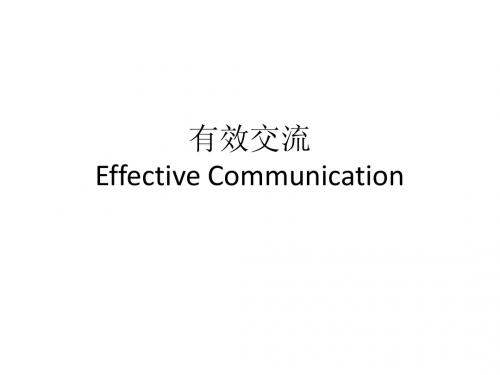
有效交流的态度
• 明确交流的目的 – 传递信息 ,解决问题,创造价值,节省时间/金钱,增进了解 正确的交流态度 – 不亢:懂得站在对方的角度考虑问题 – 不卑:明确自己的职责,利益和权力 主动/责任感 – 对自己应该负责的部分要主动 – 对自己的错误主动承担 – 主动不吃亏 – 主动有好处 抱持双赢态度 – 抛弃对立情绪 – 双赢是交流的目标也是交流的基础
•
End
– With a greeting, e.g. “You have a good day” “You have a wonderful day” – Leave a message: name, time, reason to call, phone number
•
Do:
– – – – Be enthusiasm, with smile on your face Sound professional, clear and moderate Keep a pad and pencil at the phone Patiently listen and ask pertinent questions
• •
•
• • •
Email 中的语言
• • • • • • Email Subject – 明确表达主题 – Hi, Hello, Help … means nothing 对于首次交流的对象 – 介绍自己:This is Suyun from TCS. I am writing to you regarding … 行文精确简洁,语气专业友好 – 先点主题,再做陈述 避免用粗体,全大写 – 粗体和大写 = 大喊大叫,压力 表情符 对于附件 – 在邮件中解释每个附件 – 减少使用附件 结束处 – 比较长的eMail:重申主题,明确要求/请求 – 陈述或者汇报型的eMail: • Please feel free to contact with me • Let me know if you have any questions/concerns
关于有效沟通的英文应用文

关于有效沟通的英文应用文Effective communication is essential in both personaland professional relationships. It helps us express our thoughts and feelings clearly, understand others' perspectives, and build strong connections. In this article, we will explore the importance of effective communication and provide some practical tips on how to improve communication skills.Firstly, effective communication fosters better understanding between people. When we communicate effectively, we are able to convey our thoughts andemotions in a clear and concise manner. This reduces the chances of misunderstandings and conflicts, leading to smoother interactions and stronger relationships.Secondly, effective communication helps us to buildtrust and credibility. When we communicate openly and honestly, we show others that we are reliable and trustworthy. This, in turn, helps to create a positive and supportive environment where people feel comfortablesharing their thoughts and ideas.Additionally, effective communication is crucial in resolving conflicts and addressing issues. By openly discussing problems and concerns, we can find mutually acceptable solutions and prevent misunderstandings from escalating. This promotes a healthy and harmonious environment where everyone feels valued and respected.To improve your communication skills, here are some practical tips:1. Listen actively: Pay attention to what others are saying and show genuine interest in their thoughts and feelings. Avoid interrupting or judging, and instead, focus on understanding their perspective.2. Be clear and concise: Use simple and straightforward language to convey your message. Avoid using jargon or ambiguous terms that may confuse the listener.3. Ask questions: Encourage open dialogue by asking questions to clarify information or seek further insights. This shows that you are engaged and interested in the conversation.4. Use nonverbal cues: Pay attention to your body language, tone of voice, and facial expressions. These nonverbal cues can convey emotions and intentions more effectively than words alone.5. Practice empathy: Put yourself in the other person's shoes and try to understand their feelings and perspectives. This helps to build trust and strengthen relationships.6. Give feedback: Provide constructive feedback in a respectful and constructive manner. Focus on specific behaviors or actions and offer suggestions for improvement.7. Be open to feedback: Listen to others' feedback andbe willing to make changes to improve your communication skills. Constructive criticism can help you grow anddevelop as a communicator.In conclusion, effective communication is a vital skill that can enhance all aspects of our lives. By practicing active listening, clear expression, empathy, and open dialogue, we can build strong and meaningful connectionswith others. Remember, communication is a two-way street,so it is important to be both a good speaker and a good listener. By following these tips, you can improve yourcommunication skills and foster positive and healthy relationships.有效沟通对于个人和职业关系都是至关重要的。
英语作文-有效沟通的重要性

英语作文-有效沟通的重要性Effective Communication: The Importance of Effective Communication。
Communication is an essential aspect of human interaction. It plays a vital role in our everyday lives, both personally and professionally. Effective communication is the key to building strong relationships, resolving conflicts, and achieving success in various aspects of life. In this article, we will explore the importance of effective communication and how it impacts our personal and professional lives.First and foremost, effective communication is crucial for establishing and maintaining healthy relationships. Whether it is with family members, friends, or colleagues, clear and open communication helps to foster trust, understanding, and respect. When we effectively communicate our thoughts, feelings, and needs, we create a solid foundation for meaningful connections. Without effective communication, misunderstandings and conflicts can arise, leading to strained relationships and emotional distress.In the workplace, effective communication is essential for productivity and collaboration. When team members can clearly articulate their ideas and expectations, it facilitates efficient problem-solving and decision-making processes. Effective communication also promotes a positive work environment, where employees feel valued and heard. This, in turn, boosts morale, motivation, and overall job satisfaction. On the other hand, poor communication can lead to confusion, mistakes, and a breakdown in teamwork.Furthermore, effective communication is vital for personal growth and self-expression. When we can effectively express our thoughts and feelings, we enhance our ability to connect with others on a deeper level. Effective communication allows us to share our ideas, opinions, and experiences, fostering personal development and expanding our perspectives. It also enables us to advocate for ourselves, set boundaries, and assert our needs, leading to increased self-confidence and empowerment.In addition to personal and professional relationships, effective communication is essential for resolving conflicts. Conflicts are inevitable in any relationship, but how we communicate during these challenging times can make a significant difference. When we engage in open and honest communication, actively listening to the other person's perspective, we can find common ground and work towards a resolution. Effective communication helps to deescalate conflicts, build empathy, and promote understanding.Moreover, effective communication is crucial for success in leadership roles. Leaders must be able to clearly articulate their vision, goals, and expectations to inspire and motivate their team. By effectively communicating their ideas and providing feedback, leaders can guide their team towards success. Effective communication skills also help leaders to build trust, establish credibility, and create a positive work culture.In conclusion, effective communication is of utmost importance in our personal and professional lives. It is the foundation for healthy relationships, successful collaborations, and personal growth. By honing our communication skills, we can enhance our ability to connect with others, resolve conflicts, and achieve our goals. Whether it is through verbal or non-verbal means, effective communication is the key to building strong, meaningful connections and leading a fulfilling life.。
如何高效沟通的英语作文
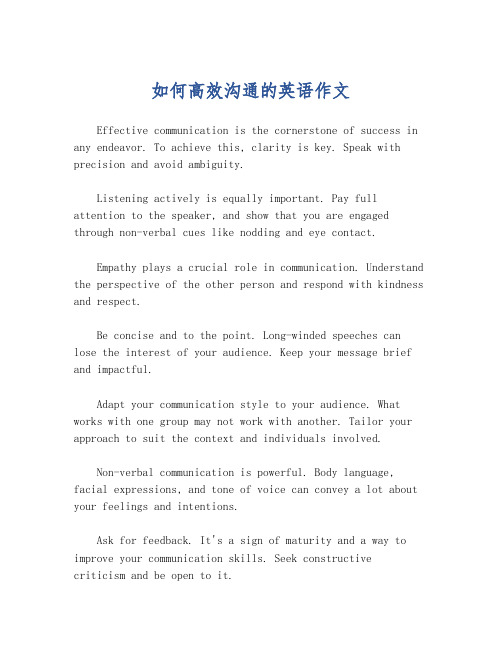
如何高效沟通的英语作文Effective communication is the cornerstone of success in any endeavor. To achieve this, clarity is key. Speak with precision and avoid ambiguity.Listening actively is equally important. Pay full attention to the speaker, and show that you are engaged through non-verbal cues like nodding and eye contact.Empathy plays a crucial role in communication. Understand the perspective of the other person and respond with kindness and respect.Be concise and to the point. Long-winded speeches can lose the interest of your audience. Keep your message brief and impactful.Adapt your communication style to your audience. What works with one group may not work with another. Tailor your approach to suit the context and individuals involved.Non-verbal communication is powerful. Body language, facial expressions, and tone of voice can convey a lot about your feelings and intentions.Ask for feedback. It's a sign of maturity and a way to improve your communication skills. Seek constructivecriticism and be open to it.Practice makes perfect. The more you communicate, the better you become at it. Take every opportunity to engage in dialogue and hone your skills.In conclusion, effective communication is a skill that can be mastered with practice, empathy, and a genuine desire to connect with others. It's about more than just speaking; it's about understanding and being understood.。
英语作文-有效的沟通技巧

英语作文-有效的沟通技巧Effective Communication Skills。
Effective communication is essential in both personal and professional contexts, enabling individuals to convey ideas clearly, build relationships, and achieve mutual understanding. This article explores key strategies for enhancing communication skills, focusing on clarity, active listening, nonverbal cues, and conflict resolution.Clarity is foundational to effective communication. It involves expressing thoughts in a concise and understandable manner. Using simple language appropriate to the audience ensures that messages are easily comprehended. Avoiding jargon or overly technical terms unless necessary helps prevent confusion and facilitates smoother interactions.Active listening is another crucial skill. It entails not only hearing the words spoken but also understanding the underlying emotions and intentions. To practice active listening, maintain eye contact, nod to show understanding, and refrain from interrupting. Paraphrasing what the speaker has said demonstrates attentiveness and ensures accurate comprehension.Nonverbal cues play a significant role in communication. Facial expressions, gestures, posture, and eye contact convey emotions and attitudes that complement verbal messages. Being mindful of these cues enhances the clarity and impact of one's communication. For instance, maintaining an open posture and nodding occasionally can signal engagement and receptiveness.Conflict resolution is an integral part of effective communication. Conflicts are inevitable in any relationship, but how they are managed determines their impact. A constructive approach involves acknowledging differences respectfully, actively listening to opposing viewpoints, and seeking mutually acceptable solutions. By focusing on shared goals and interests, conflicts can often be resolved amicably, fostering stronger relationships.Moreover, adapting communication style to different situations and audiences enhances effectiveness. For example, formal settings may require more structured and respectful language, whereas informal settings permit a more relaxed approach. Understanding cultural norms and preferences also contributes to successful cross-cultural communication, promoting inclusivity and mutual respect.Furthermore, feedback mechanisms are vital for improving communication skills. Seeking feedback from peers, mentors, or supervisors provides valuable insights into areas for improvement. Being open to constructive criticism and actively working on identified weaknesses cultivates continuous growth and development.In conclusion, mastering effective communication skills is instrumental in achieving personal and professional success. By prioritizing clarity, active listening, awareness of nonverbal cues, conflict resolution, adaptability, and feedback, individuals can cultivate meaningful relationships, foster collaboration, and navigate challenges more effectively. Continuous practice and self-reflection are key to honing these skills, ensuring ongoing improvement and relevance in an increasingly interconnected world.By consistently applying these principles, individuals can build a reputation for clear, respectful, and impactful communication, thereby enhancing their overall effectiveness and influence in various spheres of life.。
合作沟通技能英语作文

合作沟通技能英语作文Title: Effective Communication Skills for Collaboration。
Effective communication is the cornerstone ofsuccessful collaboration in any setting, be it professional or personal. It is crucial to convey thoughts, ideas, and concerns clearly and respectfully to ensure mutual understanding and productivity. In this essay, we will explore the essential communication skills necessary for effective collaboration in English.First and foremost, active listening is paramount in fostering successful collaboration. Active listeninginvolves not only hearing the words spoken but also understanding the underlying emotions and intentions. It requires giving full attention to the speaker, maintaining eye contact, and refraining from interrupting. Bypracticing active listening, individuals demonstraterespect for their collaborators' perspectives and create a conducive environment for open dialogue.Moreover, clear and concise expression is essential for effective communication in collaborative endeavors. Communicating thoughts and ideas articulately ensures that everyone is on the same page and minimizes the risk of misunderstandings. It is crucial to use simple and straightforward language, avoiding jargon or overly complex terms that may alienate others. Additionally, organizing information logically and providing relevant examples canaid in conveying messages more effectively.Furthermore, empathy plays a significant role inbuilding rapport and fostering trust among collaborators. Empathy involves understanding and sharing the feelings of others, which is essential for navigating conflicts and resolving differences amicably. By putting oneself in the shoes of their collaborators, individuals can better appreciate diverse perspectives and work towards mutually beneficial solutions. Empathetic communication fosters a sense of camaraderie and promotes a supportive team dynamic.In addition to verbal communication, nonverbal cuesalso play a crucial role in conveying messages during collaboration. Body language, facial expressions, and gestures can communicate emotions and attitudes that words alone may not convey. Maintaining open body language, such as facing the speaker and nodding in agreement, demonstrates engagement and encourages participation. Conversely, crossed arms or a furrowed brow may signal defensiveness or disagreement, hindering effective communication.Moreover, adaptability is key in navigating diverse communication styles and preferences within a collaborative environment. Recognizing that individuals may havedifferent ways of expressing themselves and receiving information is essential for fostering inclusivity and ensuring everyone feels heard and valued. Flexibility in communication allows collaborators to adjust their approach based on the needs and preferences of their team members, enhancing overall synergy and cooperation.Lastly, constructive feedback is integral to continuous improvement and growth within a collaborative setting.Providing feedback in a constructive manner involves highlighting strengths, addressing areas for improvement, and offering actionable suggestions for development. It is essential to deliver feedback with empathy and sensitivity, focusing on behaviors rather than personal attributes. Receiving feedback graciously is equally important, as it demonstrates a willingness to learn and grow from others' perspectives.In conclusion, effective communication is indispensable for successful collaboration in any context. By practicing active listening, clear expression, empathy, nonverbal communication, adaptability, and constructive feedback, individuals can foster a culture of open communication, mutual respect, and productivity within their teams. Developing these communication skills not only strengthens professional relationships but also contributes to personal growth and development.。
有效沟通职场英语作文
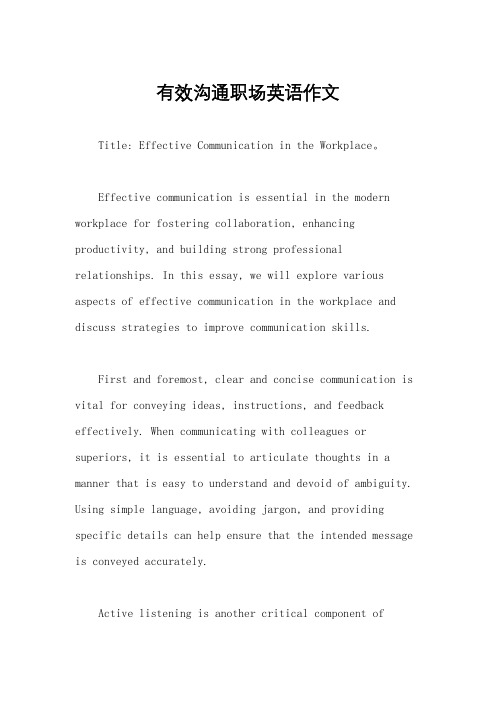
有效沟通职场英语作文Title: Effective Communication in the Workplace。
Effective communication is essential in the modern workplace for fostering collaboration, enhancing productivity, and building strong professional relationships. In this essay, we will explore various aspects of effective communication in the workplace and discuss strategies to improve communication skills.First and foremost, clear and concise communication is vital for conveying ideas, instructions, and feedback effectively. When communicating with colleagues or superiors, it is essential to articulate thoughts in a manner that is easy to understand and devoid of ambiguity. Using simple language, avoiding jargon, and providing specific details can help ensure that the intended message is conveyed accurately.Active listening is another critical component ofeffective communication. It involves fully concentrating, understanding, responding, and remembering what is being said. By actively listening to others, individuals can demonstrate respect, empathy, and understanding, which are crucial for fostering positive relationships in the workplace. Moreover, active listening enables individualsto grasp the underlying emotions and concerns behind the words spoken, leading to more meaningful interactions.Furthermore, nonverbal communication plays asignificant role in conveying messages in the workplace. Body language, facial expressions, and gestures can often communicate more than words alone. Maintaining eye contact, using appropriate facial expressions, and employing open body language can enhance the clarity and impact of one's communication.In addition to verbal and nonverbal communication, written communication skills are also essential in the workplace. Whether it's composing emails, reports, or memos, the ability to communicate effectively in writing is invaluable. Clear and coherent written communicationensures that information is conveyed accurately and professionally, leaving no room for misinterpretation or confusion.Effective communication also involves being mindful of cultural differences and diversity in the workplace. Cultural nuances, communication styles, and social norms vary across different regions and demographics. Therefore, it is essential to approach communication with sensitivity and respect for diverse perspectives and backgrounds. Embracing cultural diversity fosters inclusivity and enriches the collaborative environment in the workplace.Moreover, fostering a culture of open communication is essential for creating a supportive and transparent work environment. Encouraging feedback, both giving and receiving, promotes continuous improvement and strengthens relationships among team members. Constructive feedback should be delivered respectfully, focusing on specific behaviors or outcomes rather than personal attributes.Technology plays a significant role in facilitatingcommunication in the modern workplace. With the advent of email, instant messaging, video conferencing, and collaboration tools, communication has become moreefficient and convenient than ever before. However, it is essential to use technology judiciously and ensure that it complements, rather than substitutes, face-to-face interactions and human connection.In conclusion, effective communication is a cornerstone of success in the workplace. By honing verbal, nonverbal, and written communication skills, individuals can foster collaboration, enhance productivity, and build strong professional relationships. Moreover, embracing cultural diversity, promoting active listening, and fostering a culture of open communication are essential for creating a supportive and inclusive work environment. Ultimately, investing in communication skills is an investment in personal and professional growth.。
注意沟通技巧英语作文

注意沟通技巧英语作文Title: Effective Communication Skills。
Communication is a fundamental aspect of human interaction, essential for conveying thoughts, ideas, and emotions effectively. Mastering communication skills is crucial for success in both personal and professional endeavors. In this essay, we will explore variousstrategies and techniques to enhance communication skills.First and foremost, active listening plays a pivotal role in effective communication. When engaging in a conversation, it is imperative to give the speaker undivided attention. This involves maintaining eye contact, nodding to show understanding, and providing verbal affirmations such as "I see" or "That makes sense." By actively listening, one demonstrates respect for the speaker and gains a deeper understanding of their perspective.Moreover, effective communication requires clarity and conciseness in language. Using simple and straightforward language helps prevent misunderstandings and ensures that the message is conveyed accurately. Avoiding jargon and complex terminology, especially when communicating with individuals unfamiliar with the subject matter, promotes clarity and facilitates comprehension.Furthermore, nonverbal communication, including body language and facial expressions, significantly impacts the message's delivery. One must be mindful of their nonverbal cues, as they can convey emotions and intentions more powerfully than words alone. Maintaining open body language, such as facing the speaker and avoiding crossed arms,fosters a sense of trust and openness in the conversation.Another crucial aspect of effective communication is empathy and emotional intelligence. Understanding the emotions and perspectives of others allows for more meaningful interactions and fosters stronger connections. Empathetic communication involves acknowledging and validating the feelings of others, even if one may notnecessarily agree with them. By demonstrating empathy, individuals can build rapport and establish stronger relationships.In addition to verbal communication, written communication skills are equally important, especially in a professional context. Clear and concise written messages enhance clarity and avoid misunderstandings. When composing emails or documents, it is essential to organize thoughts logically, use proper grammar and punctuation, and proofread for errors before sending. A well-written message reflects professionalism and attention to detail, contributing to effective communication.Furthermore, adaptability is key in communication, especially in diverse or challenging situations.Flexibility in communication style allows individuals to tailor their approach based on the audience and context. Whether communicating with colleagues, clients, or superiors, adapting language, tone, and delivery to suit the recipient's preferences promotes understanding and fosters productive dialogue.Conflict resolution is another vital aspect ofeffective communication. Conflicts are inevitable in any relationship or organization, but how they are addressed can either strengthen or undermine communication. Constructive communication during conflicts involves active listening, expressing concerns calmly and respectfully, and seeking mutually beneficial solutions. By approaching conflicts with empathy and a willingness to understand the other party's perspective, individuals can resolve disputes amicably and preserve relationships.In conclusion, effective communication skills are essential for success in all aspects of life. By practicing active listening, clarity in language, mindful nonverbal communication, empathy, adaptability, and conflict resolution, individuals can enhance their communication abilities and foster stronger connections with others. Continuously refining these skills through practice andself-reflection is key to becoming a proficient communicator.。
有效的沟通性英语作文模板

有效的沟通性英语作文模板Effective Communication in English。
Effective communication in English is essential for success in today's globalized world. With English being the lingua franca of business, science, and technology, it is important to be able to communicate effectively in English to achieve success in these fields. However, effective communication in English is not just about speaking the language fluently. It also involves being able to express oneself clearly, listen actively, and understand cultural differences. In this essay, we will discuss the importance of effective communication in English and provide some tips on how to improve it.Firstly, effective communication in English is important because it allows us to convey our ideas and thoughts clearly and accurately. This is particularly important in business and academic settings where miscommunication can lead to costly mistakes. For example,if a scientist fails to communicate their research findings clearly to their colleagues, it can lead to misunderstandings and errors in subsequent research. Similarly, in a business negotiation, miscommunication can lead to a breakdown in the deal and a loss of potential profits.Secondly, effective communication in English involves active listening. This means paying attention to what the other person is saying, asking questions for clarification, and responding appropriately. Active listening is particularly important when communicating with people from different cultures, as they may have different communication styles and expectations. For example, in some cultures, it is considered rude to interrupt someone while they are speaking, while in others, interrupting is seen as a sign of engagement and interest.Thirdly, effective communication in English involves understanding cultural differences. Different cultures have different communication styles and expectations, and it is important to be aware of these when communicating withpeople from different backgrounds. For example, in some cultures, direct communication is valued, while in others, indirect communication is preferred. Understanding these differences can help avoid misunderstandings and build stronger relationships.To improve our communication skills in English, there are several things we can do. Firstly, we can practice speaking and writing in English regularly. This can be done through conversation practice with native speakers, writing emails or reports in English, or participating in English language courses. Secondly, we can actively listen to English speakers and try to understand their communication style and cultural background. Thirdly, we can read and watch English language media to improve our vocabulary and understanding of idiomatic expressions.In conclusion, effective communication in English is essential for success in today's globalized world. It involves being able to express oneself clearly, listen actively, and understand cultural differences. To improve our communication skills in English, we can practicespeaking and writing regularly, actively listen to English speakers, and read and watch English language media. By doing so, we can become more confident and effective communicators in English.。
- 1、下载文档前请自行甄别文档内容的完整性,平台不提供额外的编辑、内容补充、找答案等附加服务。
- 2、"仅部分预览"的文档,不可在线预览部分如存在完整性等问题,可反馈申请退款(可完整预览的文档不适用该条件!)。
- 3、如文档侵犯您的权益,请联系客服反馈,我们会尽快为您处理(人工客服工作时间:9:00-18:30)。
Part II Effective Questioning
天地公司的一位部门经理临时要求小刘外 出去取一份文件,而她正在打一份紧急文 件。她在这样的沟通中表达自己的意愿: 小刘:(我一定要今天上午去拿文件吗?) 如果外出的话我手头的紧急文件恐怕打不 完,(可以下午办吗?)
How to raise questions effectively
Communication Goals
To change behavior
To get and give Information
To get action
To persuade
To ensure understanding
Critical success factor for life
30% What you know
70% How you communicate it
Most common ways to communicate
Writing
Listening skills
Effective listening Effective questioning
Listening and Speaking are used a lot…
4
调查员甲:我现在向各位报告本公司新产 品—超静音洗衣机的最新市场调查报告。 这份报告。。。 调查员乙: (心里说:“如果这些幻灯片上 的白色字幕改用黑底 Listening (not!)
Behaviors that hinder effective listening Act distracted (look at your watch!) Give no response Be negative Interrupt Criticize Give advice/solutions quickly Change the subject
50% 45% 40% 35% 30% 25% 20% 15% 10% 5% 0% Writing Reading Speaking Listening 9% 16% 30% 45%
… But not taught enough
50% 45% 40% 35% 30% 25% 20% 15% 10% 5% 0% Writing Reading Speaking Listening 9% 16% 30% 45%
Distortion
What causes distortion?
Speaker
Language Wordiness Semantics Emotions Listener
Preconceived notions/expectations Physical hearing problem Speed of thought Personal interests / filtering Emotions Relying too much on notes Attention span
Paraphrasing is simply restating what another person has said in your own words.
Practice Paraphrasing & Summarizing
Use phrases such as:
In other words… I gather that… If I understand what you are saying… What I hear you saying is… Pardon my interruption, but let me see if I understand you correctly… “If I understand you correctly, your main
Summarizing pulls important ideas, facts or data together.
Let’s practice
Read to your partner a passage. Respond by paraphrasing or summarizing.
Do you feel your partner understood you? What made your partner easy/hard to listen to?
1
A:贵公司有八个方法可以立即提高内部资 讯的处理效率。这些方法包括。。。 B:很好。需要我们再买几台电脑吗?我只 要知道这个答案就够了。如果需要,数量 是多少呢?
2
刘经理:我们最新的那个广告大家喜欢得不得了, 各方面反应好极了。 赵小姐:(对自己说:“我们”是什么意思?这 是我的创意呀) 刘经理:都是赵小姐的功劳。 赵小姐:(没听到经理说的话,自言道:散会以 前我一定要让大家知道这是我的构想。) 刘经理:赵小姐,非常感谢。 赵小姐:(回过神来)感谢我?为什么?
3
刘经理:我要在这里提出一项新的公司员工福利 计划。各位不必作笔记,今天下午我会发给各位 一份计划的摘要。我们公司现在提供给员工的福 利都列在这张表上,总金额是。。。下一张幻灯 片是。。。 小李:(疯狂地抄录着每张幻灯片的资料)刘经 理,请你回到上一张幻灯片好不好?我漏了最后 两项,还有这些费用的百分比。。。
2. Open-ended questions:
Invite unique thought, reflection or an explanation. Questions begin with how, what and why.
Practice Questioning
Rephrase the following closed questions to make them open-ended:
… and not practiced effectively
70% of all communication is
Misunderstood Misinterpreted Rejected Distorted Not heard
Frustration and Chaos!
How to Listen
Ensure mutual understanding
Reflect feelings Offer acknowledgements (say “uh-huh”) Paraphrase main ideas Interrupt to clarify
How to be an active listener
Attitude Timing Content Type of questions
Two basic types of questions
1. Closed questions:
Get a one-word response and inhibit thought.
Questions begin with who, when and which
Effective Communication
Communication
Communication is the process of sending and receiving information among people…
Feedback
receiver
sender
SENDER
RECEIVER
Both children want the orange
But without good listening, neither gets what they want…
Messages not delivered due to “distortion”
Feedback
Sender
Receiver
Understand body language
Observe position and posturing Make eye contact Consider expression and gestures
Suspend judgment
Concentrate Keep an open mind Hear the person out Do not react to emotive words
1. 2. 3. 4. 5.
Are you feeling tired? Isn’t it a nice day? Was the last activity useful? Is there anything bothering you? So everything is fine, then?
Cultural Differences
What do you think about?
I have something really important to tell you Maybe I should get a haircut
How to be an active listener
Set the stage
Choose an appropriate physical environment Remove distractions Be open Maintain relaxed, open posture that shows concentration
Gender Differences
Techniques to improve listening skills
SUMMARIZE
PARAPHRASE Restate what was said in your own words Pull together the main points of a speaker
QUESTION
Challenge speaker to think further, clarifying both your and their understanding
